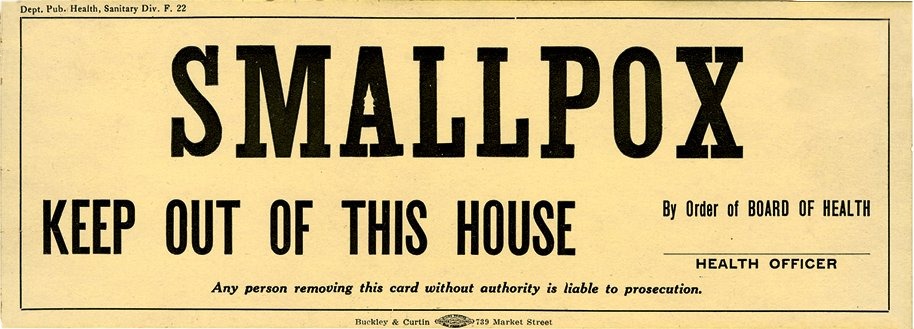All the news of the coronavirus reminded me of correspondence between Bernard Daly and the State Health Officer and Daly’s order for a county-wide quarantine in May of 1903.
Daly was a doctor long before he became a judge. As a doctor, he knew about germ theory and that disease could be spread from person to person by microorganisms that couldn’t be seen. The last major U.S. smallpox epidemic was from 1901 to 1903. Smallpox was a particularly deadly virus. Between 300 and 500 million people died of smallpox in the 20th Century alone.

Daly was determined to prevent the spread of smallpox in Lake County. On May 4th, Daly wrote to the state health officer to notify him of a case of smallpox in Silver Lake and that the patient and all exposed persons were isolated and quarantined. Convinced that case came from Crook County, where there were many cases and no or little effort to quarantine those who had been exposed. Daly strongly urged the state health officer to go to Crook County and establish strict quarantines for all exposures. If not, Daly said that he would issue a quarantine to prevent all “ingress” from that infected area.
The next day, Daly received a telegram saying to go ahead and establish the quarantine if he thought it was best. He did. On May 6th, ordered George Hanan to “… proceed to the north line of Lake County, near the McCarty place, on the stage road, and to establish and maintain at such place a quarantine station, and to prevent ingress of any and all persons, including stages carrying the United States mails and all other things from said Crook county.”
I don’t know how long the quarantine remained in place or how effective it was, but it was quite progressive for its time. The Lake County Board of Health required isolation and quarantine for all exposed to smallpox and strongly urged all residents to be vaccinated. It was a time when many believed that smallpox was associated with poverty and filth; some thought it was caused by planetary misalignment. Though vaccination with cowpox was found to be effective, many resisted. Once again, Daly was ahead of his time.
Note: The word quarantine comes from a seventeenth-century Venetian variant of the Italian quaranta giorni, meaning forty days, the period that all ships were required to be isolated before passengers and crew could go ashore during the Black Death plague.


Hi Sam,
We hope you and yours are doing well in this “interesting” time. I keep meaning to suggest to you, if appropriate, to have the “Examiner” add your posts to the “weekly reader”…as it were. The good citizens of Lake County could benefit from your research and learn more about how to appreciate how fortunate they are.
Had my first outside ride today in beautiful Central Oregon…not too far, but it beat the trainer in the garage!
cheers,
Paul
Thanks, Paul. I will contact the Examiner to see if they’ll add the posts to their weekly reader. We too are “staying in place” here in Corvallis. I’m doing house/yard projects, working on the writing project and also taking bike rides. Stay well, hope to see you sometime soon.
Don’t know if you have a copy of this, but thought that I would send it to you. It is a copy of the daily bulletin issued in Prineville in 1903 listing Smallpox isolation. Apparently I can’t add a picture (JPG), so if you will send me a note with your email address, I will send it to you. My grandmother is the Rhonda Claypool at the top of the page and her father, John Claypool is the one who died.
An interesting story, my grandmother was working in a hotel in Prineville, about 20 miles away from her home, when she caught Smallpox. She was quarantined in a little shack behind the hotel. When her father, John, found out, he borrowed a buggy from a neighbor – neither of them had a horse – and pulled the buggy to where my grandmother was, loaded her in the buggy, and pulled it and her back to their home. He soon contracted the disease himself and died on May 2, 1903.
Anything you can share with me from those days and times, particularly as it concerns the epidemic, would be greatly appreciated! I have not been able to find any photos of my great-grandfather, John Hay Claypool, or his ancestors, and would love to receive any your readers may know of. Also, if I could be certain of the town where she was working, would appreciate any pictures of the hotel, etc. (May have been Powell looking at distances on the map.)
Thanks in advance for your help,
Sincerely,
Dan M. Appel
Thank you for your note and the information about your grandmother and her father during the smallpox outbreak in the early 1900s. Tragic and also very interesting in light of our current virus situation. You might want to look at F. Shaver’s “Illustrated History of Central Oregon,” published in 1905. I did a quick search of the document and see that it includes information on Wayne Claypool, his son, Luther Claypool, and also a John Claypool, who is described as living in the Prineville area. The book is on the available on the web at books.google.com/books